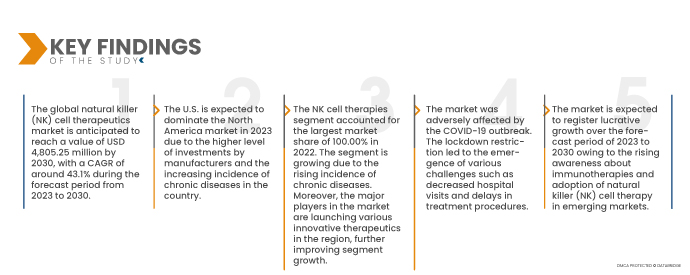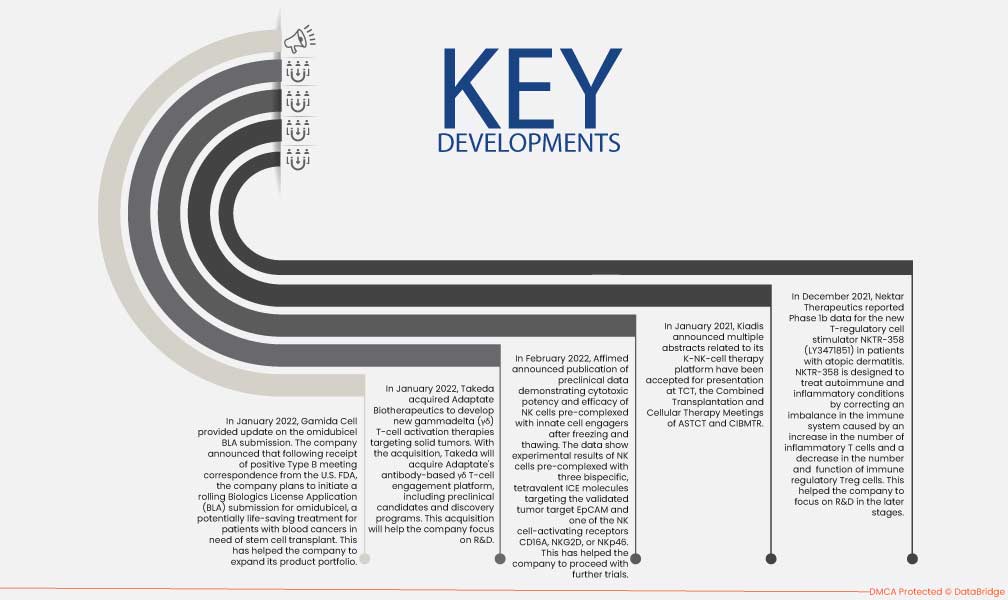人們正在廣泛研究自然殺手(NK)細胞用於治療各種類型的惡性腫瘤,例如癌症和傳染病。為了檢驗 NK 細胞療法針對流行疾病的安全性和有效性,已經進行了多項研究並且取得了積極成果。
請參閱完整報告 @ https://www.databridgemarketresearch.com/reports/global-natural-killer-nk-cell-therapeutics-market
這些結果表明,NK 細胞療法是治療癌症和傳染病的下一個有前途的免疫療法。
Data Bridge Market Research 分析稱,全球自然殺手 (NK) 細胞治療市場預計在 2023 年至 2030 年的預測期內以 43.1% 的複合年增長率增長,預計到 2030 年將達到 48.0525 億美元。由於全球慢性病患者人數不斷增加,NK 細胞療法領域預計將推動市場成長。
研究的主要發現
自然殺手(NK)細胞療法的進展
NK 細胞療法正在取得多項進展,這可能會加速 NK 細胞療法在治療癌症、傳染病和其他惡性腫瘤的其他免疫療法中的應用。這些進步促成了安全有效的 NK 細胞治療方法的開發,可用於治療多種惡性腫瘤。
為了提供患者治療各種惡性腫瘤的創新方法,我們正在不斷取得進展。這些進步為醫生為患者提供最佳治療方法鋪平了道路。因此,這意味著 NK 細胞療法的進步為市場成長提供了機會。
報告範圍和市場細分
報告指標
|
細節
|
預測期
|
2023年至2030年
|
基準年
|
2022
|
歷史歲月
|
2021(可自訂為2015-2020)
|
定量單位
|
收入(百萬美元)和定價(美元)
|
涵蓋的領域
|
治療學(NK 細胞療法和 NK 細胞靶向抗體)、方法(抗體依賴性細胞介導的細胞毒性 (ADCC) 和雙特異性抗體)、應用(癌症、免疫增生性疾病、急性傳染病、胃腸道疾病等)、最終用戶(研究和學術機構、醫院和專科診所)、分銷渠道(醫院藥房、直接投標等)
|
覆蓋國家
|
美國、加拿大、墨西哥、德國、法國、義大利、英國、西班牙、荷蘭、俄羅斯、瑞士、土耳其、奧地利、挪威、匈牙利、立陶宛、愛爾蘭、波蘭、盧森堡、歐洲其他地區、日本、中國、印度、韓國、澳洲、新加坡、馬來西亞、泰國、印尼、菲律賓、越南、亞太其他地區、巴西、阿根廷、科威特、南美洲其他地區、沙烏地阿拉伯、泰國、阿聯酋其他地區
|
涵蓋的市場參與者
|
默克公司(德國)、百時美施貴寶公司(美國)、Glycostem(荷蘭)、賽諾菲(法國)、Cytovia Therapeutics(美國)、ImmunityBio, Inc.(美國)、Biohaven Pharmaceuticals(美國)、Fate Therapeutics(美國)、EMERcells)、EMERcells(法國) Inc.(美國)、INmuneBIO(美國)、Gamida Cell(美國)、Acepodia Inc.(美國)、Affimed GmbH(德國)、Multimmune GmbH(德國)、iCell Gene Therapeutics(美國)、武田藥品(工業株式會社(日本)、Regeneron Pharmaceuticals Incce.
|
報告涵蓋的數據點
|
除了對市場價值、成長率、細分、地理覆蓋範圍和主要參與者等市場情景的洞察之外,Data Bridge Market Research 策劃的市場報告還包括深度專家分析、患者流行病學、管道分析和監管框架。
|
細分分析:
全球自然殺手 (NK) 細胞治療市場根據治療方法、方法、應用、最終用戶和分銷管道分為五個顯著的部分。
- 根據治療方法,市場分為 NK 細胞療法和 NK 細胞定向抗體。 2023 年,NK 細胞療法領域預計將佔據市場主導地位,市佔率為 100.00%,預計到 2030 年將達到 30.6588 億美元,在 2023 年至 2030 年的預測期內複合年增長率為 34.2%。
2023 年,NK 細胞療法領域預計將佔據市場主導地位,因為 NK 細胞是參與癌症監測和消除的先天性細胞毒性淋巴細胞。此外,NK 細胞療法也取得了一些進展,例如標靶識別、過繼治療和細胞毒性的改善。
- 根據方法,市場細分為抗體依賴性細胞介導的細胞毒性 (ADCC) 和雙特異性抗體。 2023 年,抗體依賴性細胞介導細胞毒性 (ADCC) 領域預計將佔據市場主導地位,市場份額為 100.00%,預計到 2030 年將達到 46.7303 億美元,在 2023 年至 2030 年的預測期內複合年增長率為 42.5%。
- 根據應用,市場細分為癌症、免疫增生性疾病、急性傳染病、胃腸道疾病等。預計 2023 年癌症領域將佔據市場主導地位,市佔率為 100.00%,預計到 2030 年將達到 43.4967 億美元,在 2023 年至 2030 年的預測期內複合年增長率為 41.1%。
- 根據最終用戶,市場分為醫院、專科診所以及研究和學術機構。預計 2023 年醫院部門將佔據市場主導地位,市佔率為 84.73%,預計到 2030 年將達到 40.2078 億美元,在 2023 年至 2030 年的預測期內複合年增長率為 42.8%。
- 根據分銷管道,市場分為醫院藥房、直接招標和其他。預計 2023 年醫院藥局部門將佔據市場主導地位,市佔率為 92.20%,預計到 2030 年將達到 44.5619 億美元,在 2023 年至 2030 年的預測期內複合年增長率為 43.2%。
主要參與者
Data Bridge Market Research 將以下公司視為全球自然殺手 (NK) 細胞治療市場的參與者,包括默克公司 (德國)、百時美施貴寶公司 (美國)、Glycostem (荷蘭)、賽諾菲 (法國)、Cytovia Therapeutics (美國)、ImmunityBio, Inc. (美國)、Biohaven Pharmaceticals (Fate)、法國美國 (Fate)、法國人(Erapce) (美國)、PersonGen BioTherapeutics (中國)、Innate Pharma, Inc. (美國)、INmuneBIO (美國)、Gamida Cell (美國)、Acepodia Inc. (美國)、Affimed GmbH (德國)、Multimmune GmbH (德國)、iCell Gene Therapeutics (美國)、美國武田藥劑Inc. (美國) 等。
市場開發
- 2022年1月,武田收購了Adaptate Biotherapeutics,以開發針對實體腫瘤的新型γδ(γδ)T細胞活化療法。透過此次收購,武田將獲得 Adaptate 基於抗體的 γδ T 細胞參與平台,包括臨床前候選藥物和發現項目。 Adaptate 的 γδ T 細胞結合劑旨在專門調節腫瘤部位的 γδ T 細胞介導的免疫反應,同時避免對健康細胞造成損害。此次收購將有助於該公司專注於研發。
- 2022 年 1 月,Gamida Cell 提供了有關 omidubicel BLA 提交的最新消息。該公司宣布,在收到美國 FDA 的積極 B 類會議函件後,該公司計劃啟動 omidubicel 的滾動生物製品許可申請 (BLA) 提交,omidubicel 是一種可能挽救需要幹細胞移植的血癌患者生命的治療方法。這有助於該公司擴大其產品組合。
- 2022 年 2 月,Affimed 宣布發布臨床前數據,證明凍融後與先天細胞接合劑預複合的 NK 細胞的細胞毒性效力和功效。數據顯示了 NK 細胞與三種雙特異性四價 ICE 分子預先複合的實驗結果,這些分子針對已驗證的腫瘤標靶 EpCAM 和 NK 細胞活化受體 CD16A、NKG2D 或 NKp46 之一。這有助於該公司進行進一步的試驗。
- 2021 年 1 月,Kiadis 宣布其 K-NK 細胞治療平台相關的多篇摘要已被接受在 TCT(ASTCT 和 CIBMTR 聯合移植和細胞治療會議)上發表。一家臨床階段生物製藥公司開發了基於 NK 細胞的創新藥物,用於治療危及生命的疾病。該公司宣布,其 K-NK 細胞治療平台相關的四篇摘要已被接受在 TCT 會議、美國移植和細胞治療學會 (ASTCT) 的移植和細胞治療會議以及國際血液和骨髓移植研究中心 (CIBMTR) 上發表。
- 2021年12月,Nektar Therapeutics發表了新型T調節細胞刺激劑NKTR-358(LY3471851)治療異位性皮膚炎患者的1b期數據。 NKTR-358 旨在透過糾正因發炎 T 細胞數量增加和免疫調節 Treg 細胞數量和功能減少而導致的免疫系統失衡來治療自體免疫和發炎疾病。這有助於公司後期專注於研發。
區域分析
從地理上看,全球自然殺手 (NK)細胞治療市場報告涵蓋的國家包括美國、加拿大、墨西哥、德國、法國、義大利、英國、西班牙、荷蘭、俄羅斯、瑞士、土耳其、奧地利、挪威、匈牙利、立陶宛、愛爾蘭、波蘭、盧森堡、歐洲其他地區、日本、中國、印度、韓國、澳洲、新加坡、馬來西亞、泰國、印尼、菲律賓、越南、亞太地區其他地區、巴西、阿根廷、阿根廷、其他地區、其他地區、歐洲、紐約、紐約地區、紐約、紐約、紐約、紐約、紐約、分別、歐洲地區國家、英國國家、歐洲地區、歐洲國家國家科威特、歐洲國家。
根據 Data Bridge 市場研究分析:
2023-2030 年預測期內,北美是全球自然殺手 (NK) 細胞治療市場的主導地區
2023 年,由於美國製造商的投資水平較高以及美國慢性病盛行率不斷上升,北美在全球自然殺手 (NK) 細胞治療市場佔據主導地位。北美將繼續在市場份額和市場收入方面佔據主導地位,並將在預測期內繼續保持其主導地位。這是由於該地區越來越多地採用先進技術並推出新產品。此外,慢性病病例的增加和 NK 細胞療法的進步預計將推動該地區的市場成長率。
預計在2023-2030 年預測期內,亞太地區將成為全球自然殺手 (NK) 細胞治療市場成長最快的地區
由於主要市場參與者的存在以及該地區新興經濟體醫療設施的快速發展,預計亞太地區在預測期內將實現成長。除此之外,醫療保健支出水準的提高和人均收入的增加預計將推動該地區的市場成長率。
有關全球自然殺手 (NK) 細胞療法市場報告的更多詳細信息,請點擊此處 - https://www.databridgemarketresearch.com/reports/global-natural-killer-nk-cell-therapeutics-market












